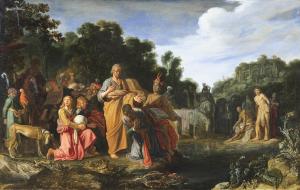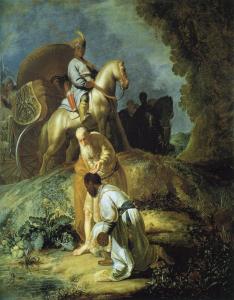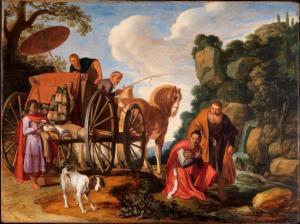 According to my electronic records, this essay will be the 500th addition to my Patheos blog list. I remain grateful to the site for allowing me to continue to express myself in this way, extending appreciably my ministry of Bible study, preaching concerns, and continuing reflections on matters theological. I of course hope to continue this work that is deeply fulfilling for me, and has, as I have been told, held some value for my few readers over the years. Thanks then to Patheos and to you, my readers. May our relationships remain viable and valuable!
According to my electronic records, this essay will be the 500th addition to my Patheos blog list. I remain grateful to the site for allowing me to continue to express myself in this way, extending appreciably my ministry of Bible study, preaching concerns, and continuing reflections on matters theological. I of course hope to continue this work that is deeply fulfilling for me, and has, as I have been told, held some value for my few readers over the years. Thanks then to Patheos and to you, my readers. May our relationships remain viable and valuable!
It is to me quite appropriate that this particular essay includes two of my special loves: careful Bible story reading and a potential story sermon. It unfortunately does not include a great tale from the Hebrew Bible, my central biblical focus, though the Hebrew Bible surely will play an important role. It does include a fine and rich story from the book of the Acts, from the texts that the lectionary collectors have long substituted for the usual Hebrew Bible selections during the period from Easter to Pentecost. We address then today the remarkable tale of Phillip and the Ethiopian eunuch from Acts 8:26-40.
But first we need to examine the texts from the Hebrew Bible’s Deuteronomy and Isaiah that surely spawned the Acts account, or at least lie prominently in the background. Deut.23:1 reads: “No one whose testicles are crushed or whose penis is cut off shall be admitted to the assembly of YHWH.” In the thinking of the priests of Israel, a male whose penis was either damaged in war or by other means, or whose penis was removed so as to create him a eunuch was prohibited from joining the worshipping community of YHWH. Presumably, a male without a functioning sexual organ was considered less than a full male and was thereby thought to be inadmissible to the community of the chosen people. Of course, by modern standards such a judgment was both cruel and bigoted, excluding many males on grounds we now find ludicrous.
However, later in Israelite history this exclusionary stance was rethought, leading Isaiah, sometime after the Babylonian exile of the 6th century BCE, to write: “Concerning the eunuchs who keep my Sabbaths, who choose the things that please me, holding fast my covenant, I will give, in my house and within my walls, a monument and a name better than sons and daughters; I will give them an everlasting name that shall not be cut off” (Is.56:4-5). This is an extraordinary passage of wonderful inclusivity for those formerly excluded from the people of Israel. No one could possibly miss the rich irony as the author employs the word “cut off,” formerly used to describe the removal of the penis from the eunuch, but now used to describe the “everlasting name” bestowed on them by YHWH, a name that will never be “cut off.” No more graphic example can be found to demonstrate the constant reevaluation of Israel’s thinking about Torah and its admonitions than this movement from Deuteronomy to Isaiah.
The text from Acts makes it certain that the inclusiveness of Isaiah has won the day, since in the story the Ethiopian eunuch is returning home after worshipping in Jerusalem. Thus, he is already a member of the worshipping community of Israel, allowed to participate with them, though both a eunuch and a foreigner. Thus, it may be concluded that Acts 8 is nothing less than a story sermon based on the Israelite openness to all people; whatever exclusions early Israel may have imagined might bar others from joining them in the worship of YHWH, have now been rejected. The Ethiopian eunuch is welcome among them. It is normally thought that Peter’s full acceptance of the Roman centurion is the parade example of a growing early Christian inclusiveness (Acts 10-15), but this story of Phillip and the Ethiopian eunuch is surely another indication that Christianity was from its very earliest days moving toward full inclusion of any who would find in the community of Christ the fuller meaning for their lives. How better to make that claim memorable than by telling this story?
Once upon a time, the evangelist, Phillip, always open to the promptings of the Spirit of God, was accosted by an angel and told to head southward along a desert road that joins Jerusalem and Gaza, that ancient Philistine coastal city. Without a word, he went as the angel had said. Suddenly, he saw an Ethiopian, a Cushite, who lived far from any place Phillip had ever seen. This man was obviously an important one, for he was riding in a very large chariot, driven by another man, who drove the chariot while the Ethiopian was sitting and reading from a scroll. Phillip later discovered several things about this impressive man; he was a eunuch, that is, a man who had been castrated when young in order to prepare him for significant government service, a common practice in the day. Not only was he in the service of Queen Candace, the current ruler of his country, but he was no less than the official of her court who was in charge of all her treasury, a powerful man indeed! Another thing about the man Phillip was to learn is that his reading for the day was from the prophet Isaiah. The fact that the man was an Ethiopian or that he was an exotic foreigner was no impediment for Phillip as we will see.
As the chariot rolled past, the Spirit whispered to Phillip, “Approach and get near the chariot.” So Phillip ran to catch up with the chariot, and as he loped along with the vehicle that moved at a leisurely pace to allow the eunuch’s eyes to focus on the page, he heard that he was reading from Isaiah, for the man was reading aloud as all did in those times. “Can you understand what you are reading?” asked Phillip. The man in the chariot looked down at the man, loping near his chariot, and replied, “How can I, unless I have a guide?” Then he invited Phillip into his very large chariot where he sat down near the Ethiopian. The man had surely read this prophet before, perhaps during his trips to the Jerusalem temple, but this text was confusing, and he needed help to grasp what it could be about. He was reading from one of Isaiah’s Songs of the Servant, the fourth one from Is.53:7-8, referring to a mysterious servant who “like a sheep is lead to the slaughter…whose life is taken away from the earth.” The eunuch is reading from the Greek text of the Hebrew Bible, as most first-century readers would have done, but there is something sharply different about this Greek translation from its Hebrew original. The Hebrew speaks of the death of the servant, while the Greek version could suggest that the servant’s life is “lifted from the earth.” Perhaps that is the cause of the perplexity of the man in the chariot, who asks Phillip, in a quite desperate voice, “Who is the prophet talking about? Is he talking about himself or someone else?”
And Phillip took that question as his opening to proclaim the good news about Jesus, “beginning from this Scripture.” Just as Jesus himself had preached to those downcast pilgrims on the road to Emmaus in Luke’s gospel, “interpreting for them the things about himself,” so now Phillip preaches in the same way to this searching Ethiopian. Just as Phillip had ended his sermon, convincing the eunuch that in fact Isaiah had been referring to Jesus, the eunuch spies a body of water, and urges Phillip to baptize him immediately. He ordered his driver to stop the chariot, and both the eunuch and Phillip leap from the chariot and into the water, where Phillip performs the baptism. But as the two of them rise to the water’s surface, Phillip, rather like Elijah before him, is snatched away by the Lord’s Spirit, so that the eunuch never laid eyes on him again. But that did not stop the eunuch from continuing his journey home, rejoicing all the way. As for Phillip, he found himself in Azotus, a tiny hamlet on the coastal road. He continued on that road until he reached the large city of Caesarea, all the while proclaiming the good news of Jesus.
This grand tale makes it plain that exclusions are not possible from the truly Christian community; all are equally welcome; all are equally loved and cherished. Deep Scripture reading and baptism are available to all, and help any who would come to participate with joy and thanksgiving in the living church of Jesus. The story sermon of Phillip and the Ethiopian eunuch is all the proof we need to realize that when we exclude anyone from the beloved kingdom of God, we are not doing God’s bidding, but following our own too-narrow path. The tale of the Ethiopian eunuch calls all that into the most serious question.
(Images from Wikimedia Commons)











